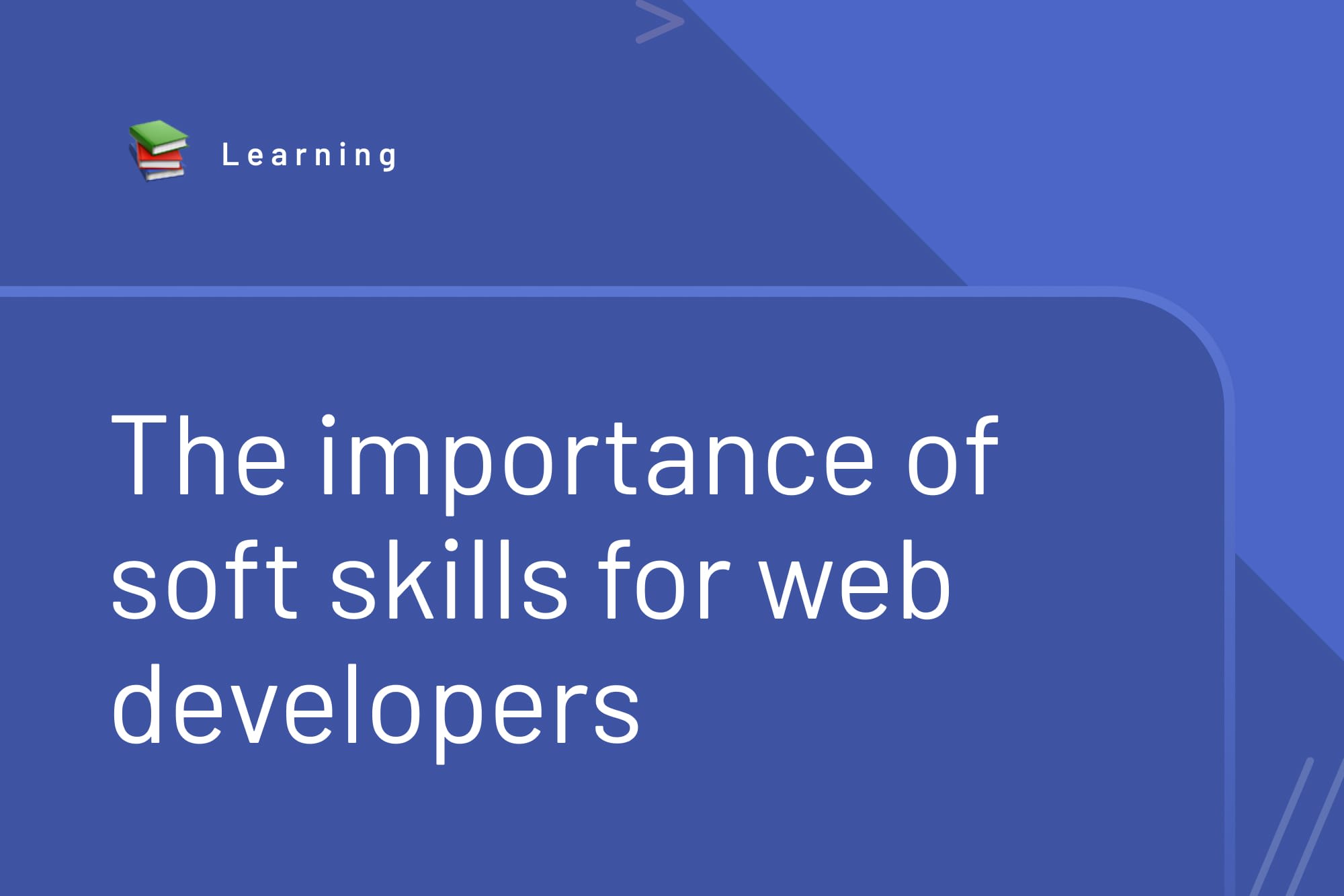
The importance of soft skills for web developers
Qualities like good communication and teamwork are essential to learn, especially as you navigate your career. In this article, Nicole outlines some important soft skills to help you in your journey.
Table of contents
When we chat about being a web developer, we often dive straight into all the technical stuff - programming languages, frameworks, debugging...you name it! But what about those skills that don't involve code but are still crucial in our day-to-day work? This article aims to dive into the importance of soft skills!
What are soft skills?
Soft skills are those intangible qualities that help you work and interact with other humans. Things like communicating effectively with others, managing your time and projects, and solving problems! These skills often cannot be taught at school or learned through YouTube tutorials.
In contrast, hard skills are the technical abilities you pick up from formal training or experience, like knowing HTML or JavaScript. It's essential stuff, for sure, but without soft skills, it's like having all the tools and no idea how to build the foundation.
Why are soft skills essential?
As a web developer, you're not just tucked away in a cozy space, crafting code. You're interacting with clients, teammates, and sometimes even end-users. Soft skills ensure the process goes smoothly, efficiently, and more enjoyably.
Soft skills are essential for a more dynamic and effective working environment, and they are needed in a professional career space.
By now, we know the basics: soft skills are those vital human skills that complement your technical skills.
What soft skills are important for developers?
Communication
Scenario: You work in a web development agency and present your most recent work to your client. No one grasps its utility or even its functionality. This isn't a testament to your technical ability but a reflection of how you've communicated it. Effective communication goes beyond just speaking; it's about ensuring clarity, setting the proper context, and fostering understanding. It's the bridge between your brilliant ideas and their successful implementation.
How to improve your communication skills:
-
Written skills: Start with writing down your thoughts more frequently. Whether it's drafting detailed documentation, blogging about your latest coding adventure, or even just maintaining a daily journal, each written word hones your ability to convey your ideas.
-
Feedback loop: Feedback is a developer's best friend. And I’m not just talking about code reviews. Share your written pieces with peers, be it emails, project proposals, or even casual write-ups. Their insights can offer invaluable perspectives on clarity, tone, and content effectiveness.
-
Visual aids: Incorporate diagrams, flowcharts, or even simple doodles when explaining complex concepts. A visual representation can often simplify complex ideas, making them more digestible for your audience.
-
Practice makes perfect: Engage in tech communities like Frontend Mentor, Stack Overflow, or on social media. These platforms help you articulate your thoughts and get you discussing ideas with other developers.

Time management
Scenario: you begin your day with a seemingly straightforward coding task. But hours later, you find yourself lost in a maze of code, having veered off on numerous tangents. Sounds familiar? With endless distractions and other tasks you need to do, it’s very easy to drift endlessly, investing time in places that don’t yield the desired results. Efficiently managing your time isn't just about being punctual; it's about enhancing productivity, ensuring quality, and maintaining a work-life balance.
How to improve your time management skills:
-
Clarity of purpose: Kick off your day with a well-defined agenda. It's easy to lose track of time when you don't have specific milestones. By listing three primary tasks, you set tangible targets for yourself, ensuring you stay on course.
-
Pomodoro technique: This time-tested method encourages focused sprints of work punctuated by short breaks. It’s not just about discipline but also about mentally rewarding yourself with those breaks. This cyclical process ensures that fatigue doesn't dampen your efficiency.
-
Digital detox: We've all been there – one minute you're checking a message, the next you're deep into your third consecutive video on 'cats that can sing.' Setting specific times for social media checks and sticking to it can substantially increase productivity. Consider tools or browser extensions that limit your access to distracting sites during work hours.
-
Task prioritization: Understand the weightage of your tasks. Which ones are critical? Which ones have looming deadlines? Systems like the Eisenhower Box can help categorize tasks based on urgency and importance.
-
Reflection: At the end of each day or week, take a moment to reflect. Where did you spend most of your time? Were there any unanticipated distractions? This introspection can offer invaluable insights and guide your time management strategies.
Active listening
Listening is a fundamental human interaction, yet how many of us can genuinely say we're good at it? Especially in a professional setting, it's not just about catching the words that are said. It's delving deeper, grasping the nuances, the unspoken sentiments, and the hidden concerns. In the context of web development, active listening is a powerful tool. It's the bridge between client expectations and your execution. Misunderstandings can be costly in terms of time, resources, and reputation. Truly hearing and understanding can mean the difference between nailing a project in one go and endless frustrating revisions.
How to improve your active listening skills:
-
Mindfulness in conversations: While the term 'mindfulness' often brings up images of meditation, its core principle is simple: being in the present. When you're in a meeting or a discussion, be all in. Resist the urge to mentally script your next response or get distracted by other tasks. Engage fully with what's being said.
-
Paraphrasing and clarification: After someone has shared a point, paraphrase it back to them: "So, if I've understood correctly, you're suggesting...". This confirms your understanding and reassures the speaker that they're being heard.
-
Take notes: Whether you're old school with pen and paper or more digitally inclined, jotting down key points can be useful. Not only does it help reinforce and organize what you've heard, but it also serves as a handy reference for the future.
-
Ask open-ended questions: Instead of simple yes or no questions, encourage elaboration. Questions like "What are the problems we’re trying to solve with this feature?” or "How do you see this feature enhancing user experience?" can open up more detailed discussions, ensuring clarity.
Problem-solving
No matter how well planned, every project is bound to encounter unexpected obstacles that are part of the journey. What differentiates a good web developer from a great one is not the absence of problems but the ability to address them. The ability to tackle complex issues, adjust when necessary, and develop creative solutions sets you apart as a professional. In web development, where minor issues can lead to more significant challenges, having strong problem-solving skills is essential.
How to improve your problem-solving skills:
-
Structured approach: When faced with a problem, resist the urge to dive in headfirst. Take a moment to deconstruct the issue into its relevant parts. This not only makes it more manageable but often reveals underlying problems that might have otherwise been overlooked.
-
Research and learning: Remember, every problem you encounter is a learning opportunity. Before forging a solution, spend time researching. Has someone else encountered a similar issue? What solutions exist in the broader community? Platforms like Stack Overflow can be goldmines of information.
-
Brainstorming: Two heads are better than one, as they say. When stuck, don't hesitate to pull in a colleague or two for a brainstorming session. Different perspectives can offer fresh insights, and collaborative problem-solving can lead to more robust solutions.
-
Feedback and iteration: Once you've crafted a solution, seek feedback. Understand its strengths and potential vulnerabilities. Iterative refinement based on feedback ensures your solutions are not just effective in the short term but resilient in the long haul.
-
Embrace failures: Sometimes, failing or hitting a roadblock is the best teacher. It forces introspection, fosters resilience, and, more often than not, leads to more profound insights and innovations.
Teamwork
Whether with designers, content creators, or other developers, you're part of a team. Ensuring a harmonious work environment will not only make projects run smoother but also make work a lot more enjoyable. When everyone is in sync, projects hit their objectives and often exceed them. But beyond the practicalities of getting a project over the finish line, effective teamwork creates a work environment that's uplifting, collaborative, and just plain fun. When camaraderie is high, stress is reduced, and creativity flows freely.
How to improve your teamwork skills:
-
Team-building activities: These aren't just reserved for corporate retreats. Think of activities that can bond the team without feeling forced. A trivia night, a book club or even collaborative video games can boost morale and foster connections.
-
Regular check-ins: Rather than waiting for scheduled meetings, have casual check-ins with team members. This keeps communication channels open and ensures everyone feels valued and heard.
-
Know your team: Everyone brings a unique set of skills to the table. By understanding each member's strengths, you can align tasks that not only get the best out of them but also elevate the overall output of the team.
-
Conflict resolution: Differences of opinion are natural in a team setting. However, addressing them constructively is key. Instead of avoiding or escalating conflicts, approach them with empathy, active listening, and a focus on finding common ground.
-
Collaborative tools: Invest time learning and utilizing collaborative tools like Slack, Trello, or Asana. These platforms streamline communication, keep everyone in the loop, and ensure a cohesive approach to projects.
-
Feedback loop: Encourage a culture where feedback, both positive and constructive, is shared openly. Regular feedback sessions can highlight areas of improvement, recognize commendable work, and foster a growth mindset within the team.

Adaptability
In the tech world, stagnation is the real enemy. The digital arena is evolving at lightning speed. Just when you think you've got a grip on the current tools, languages, or platforms, new ones emerge, setting the pace for the industry. This rapid pace of change isn't just a challenge; it's the nature of the beast. Staying adaptable ensures you remain at the forefront, keeping your skills relevant and your offerings cutting-edge.
How to become more adaptable:
-
Consistent learning: It's crucial to have a dedicated time in your schedule, whether weekly or monthly, purely for learning. This isn't about diving deep into every new tool but rather staying informed about what's emerging and where the industry is gravitating.
-
Engage with digital communities: Places like Stack Overflow or GitHub are buzzing with discussions on the latest trends, challenges, and tools. There are also online communities, such as Frontend Mentor’s Discord community, filled with resources, advice, and general tech chat! Immersing yourself in these conversations gives you a firsthand insight into the shifts in web development.
-
Podcasts and webinars: There are countless podcasts and webinars with industry experts discussing the latest technology. Tuning in can provide you with a broader understanding of global tech trends.
-
Embrace the beginner's mindset: This is all about humility in learning. It's the understanding that no matter how much you know, there's always room to learn more. This mindset keeps you open to new knowledge, tools, and methodologies, ensuring you never become complacent.
-
Workshops and conferences: While digital resources are invaluable, there's still much to gain from attending workshops and conferences. These events can expose you to practical applications of new tools, provide networking opportunities, and allow you to glean insights from face-to-face interactions with industry leaders.
-
Seek feedback: In the journey of continuous learning, feedback is your roadmap. Regularly asking peers or mentors to review your work can offer fresh perspectives and highlight areas where newer methods might be more effective.
The road to improving your soft skills as a developer
Web development is about more than just mastering the latest tools or languages. It's about understanding people, working well with teams, and staying ahead in a fast-evolving landscape. The soft skills we've discussed - from communication and time management to adaptability - play a critical role as any technical expertise. They determine how we approach challenges, collaborate with peers, and grow in our careers. As we delve into the ever-complex realm of web development, it's essential to remember the human side of the equation. After all, the balance of technical know-how and interpersonal skills truly defines a successful web developer.
Take your skills to the next level
- AI-powered solution reviews
- 50+ portfolio-ready premium projects
- Professional Figma design files